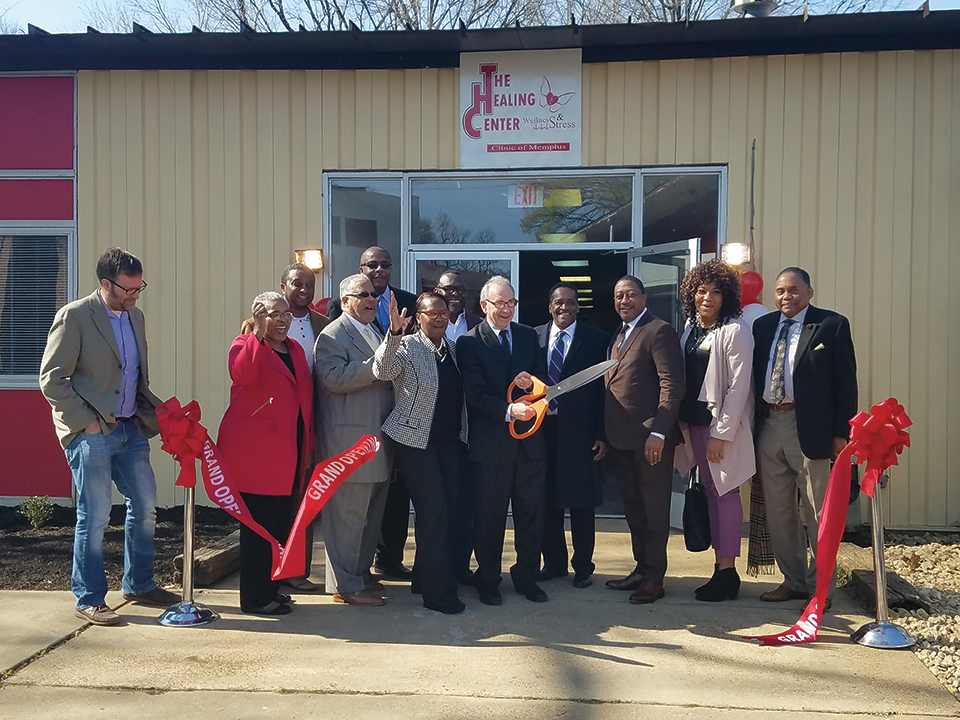
“We can have an impact right here, right now,” said David M. Stern, MD, vice chancellor for Health Affairs for Statewide Initiatives at the University of Tennessee Health Science Center, summing up the importance of the new Wellness & Stress Clinic of Memphis that opened today in the Oakhaven community in South Memphis.

Located at The Healing Center Baptist Church, 3885 Tchulahoma Road, the clinic stems from a unique partnership that includes the church and volunteer support from UTHSC, the University of Memphis, Rhodes College, local government, Memphis Area Legal Services, and the West Cancer Center. The church was founded in 1991 by Bishop William Young and his wife, Pastor Dianne Young, and has been an anchor for the community.
Dr. Stern worked with the Youngs, who had a vision for a health clinic at their church, to help pull together the volunteer coalition to make it happen. He will serve as the clinic’s executive director.
Health care, academic, faith, and government leaders, as well as members of the congregation and the community gathered at the church for a morning ceremony, ribbon cutting, and tour of the clinic.
“I couldn’t be prouder of anything that UTHSC has been involved with,” Ken Brown, JD, MPA, PhD, FACHE, UTHSC’s executive vice chancellor and chief operations officer, told the crowd. “UTHSC is involved in a lot of projects nationally and internationally, and I know of no more important thing than this.”
The clinic represents a model for positioning health care services in a trusted place in a particular community outside of the usual health care setting in order to have maximum impact.
“You have to go into the community where people are and in a place they trust,” Dr. Stern said. The Healing Center Baptist Church has been that place in Oakhaven for almost three decades.
The clinic will offer free primary care, medication management, substance abuse and mental health counseling, as well as resources to assist with housing, employment, stress management, and legal issues, all of which impact overall well-being.
“These are the kinds of things that change a community,” Dr. Stern said. “We see the Wellness & Stress Clinic as part of a promise for each person in the community to reach their potential.”
Pastor Young said she is confident the clinic will have an impact on the community beyond physical health. “With the valuable stakeholders assembled for this project, we are now positioned to give this community not just help, but hope, an intangible commodity,” she said.
UTHSC is providing furniture, exam equipment, and resources for the building, as well as medical, physician assistant, nursing, and pharmacy students and faculty volunteers. The city is providing funds to help renovate the building. The organizers are working with volunteers from the social work program at the U of M and Memphis Area Legal Services. Rhodes College student volunteers will offer nutrition and fitness support.
West Cancer Center will be available onsite at the clinic location periodically to screen individuals for grant-covered medical services provided via the UT/West Institute for Cancer Research and Susan G. Komen Memphis-MidSouth Mississippi. The Margaret West Breast Center Mobile Mammography Unit provided screenings at the opening event.
Peter Hossler, PhD, an assistant professor of Urban and Community Health at Rhodes College, has helped lead the clinic effort, and will be program director for the clinic. “This clinic is designed to address the physical, mental, and spiritual health needs of residents of Memphis, who often face barriers to improving their health,” he said.

Housed in a separate building on the church campus, the clinic includes three exam rooms, rooms for classes and group meetings, and fitness rooms. Initially, it will be open one Monday a month from 5 to 8 p.m., expanding to once a week in six months to a year. The first clinic will be held on Monday, April 23.
“There are few cities that have the abundance of medical, social work, legal, and other health supportive services that we enjoy here in Memphis,” Dr. Hossler said. “We still have many things to figure out to further support health improvement and equity, but I believe we do have the private, governmental, and philanthropic abundance that can make these improvements possible and consequently ensure greater health equity for all of the people who make up Memphis.”
.
